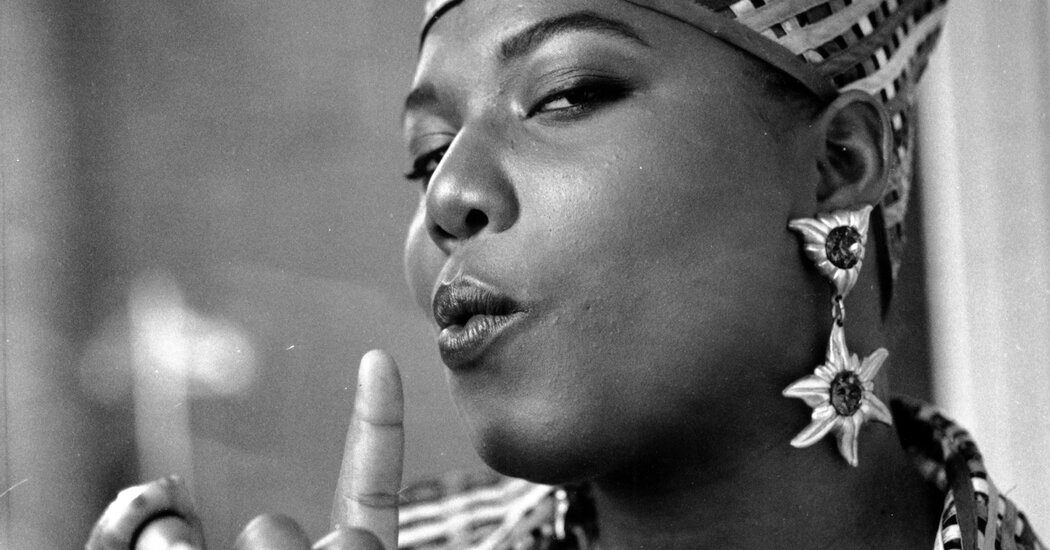
An essential American art form reaches a milestone.
For 50 years, the essential writing — fables, comedies, diaries; adventure, memoir, porn — about young Black life in this country has been happening in hip-hop. Songs about feelings, fantasies, dilemmas, confessions, fantasias. What else is Notorious B.I.G.’s “Ready to Die” and its grueling, knowing, melodic re-creation of moral decay and sexual congress other than a triumph of literature? It is but one title on a shelf buckling with scores of comparable powerhouses. That’s one masterpiece set in New York.
What eventually brews in Houston and Atlanta, Miami, New Orleans and Memphis, in Virginia and California, deepens hip-hop, takes it into freaky, funky, bouncy, hilarious, mischievously brewed realms, dark, dreamy, unstable landscapes. Frailty, paranoia, trippiness, Afrocentrism and minimalism emerge. It’s music mining the past but potently about the present, often about itself. Hip-hop kids didn’t know a national struggle for civil rights as more than lore or part of a lesson plan. They had experienced personal strife — the struggle for food, shelter, safety, stability, jobs and respect. How many of these artists came of age in or adjacent to public housing and the criminal-justice system? Plight was in the art.
Hip-hop represents a break with the past because it exploded out of something that broke: this country’s promise to its Black citizens. And unlike aspects of jazz and Motown, this new music wouldn’t be arguing for its resplendence, worthiness and incomparable ingenuity. Salves, appeasement, subtlety, civility, love — those evidently didn’t work because here we are. Bring the noise.
Its practitioners may have attended church, but there’s little church in this music, especially during its first waves, just communal jubilation and the streets. “La di da di, we like to party” alongside “I never prayed to God, I prayed to Gotti.” Hip-hop arose from want. It thrived in gain. The average love song culminates in consumption, brandishing what has been consumed. Capitalism has been trying to turn its back on Black America and to break Black America’s back. Hip-hop is Julia Roberts after being written off in “Pretty Woman” by that snooty sales lady: Big mistake. Big. Huge.
You can read Wesley’s full celebration here.
More from the Magazine
-
The story of hip-hop can be told through the stunning evolution of bling.
-
The future of rap is female: As their male counterparts turn depressive, women are having all the fun.
-
Mahogany L. Browne, Lincoln Center’s poet in residence, wrote a love letter to hip-hop composed entirely of lyrics. Put your headphones on.
-
The rappers we lost: Biggie, Tupac, DMX and 60 other stars who died too young.
THE LATEST NEWS
Hawaii Wildfires
-
Wildfires spread across Maui, killing at least 36 people and forcing thousands of residents and tourists to evacuate.
-
The fires have been mostly contained.
-
Some people escaped flames by swimming into the ocean.
-
Lahaina, a coastal town that was once Hawaii’s royal capital, was “almost totally burnt to the ground,” Senator Brian Schatz said.
-
Climate change has made Hawaii more susceptible to wildfires. Winds from a hurricane in the Pacific also exacerbated these fires.
China
-
Biden signed an executive order banning new American investment in some Chinese technology such as semiconductors and A.I.
-
The order is expected to heighten tensions between the two powers, The Wall Street Journal reports.
International
-
A presidential candidate in Ecuador was assassinated at a rally days before the election. Read more about his life antagonizing the powerful.
-
Ukraine targeted Moscow with two more drones, Russian officials said.
-
Kidnappers in Haiti freed an American nurse and her child.
Politics
-
A man who threatened to assassinate President Biden was killed by an F.B.I. agent during a raid on his home in Utah.
-
Gov. Ron DeSantis suspended Orlando’s top prosecutor, accusing her of going easy on violent crime — which she disputes. She’s the second elected Democratic prosecutor he has removed this year.
-
Senator Dianne Feinstein, 90, was briefly hospitalized after falling in her home in San Francisco.
Trump Indictment
-
Prosecutors obtained a search warrant for Donald Trump’s Twitter account this year in connection with their Jan. 6 inquiry.
-
It’s the first known example of prosecutors directly searching Trump’s communications.
Climate
-
A typhoon made landfall on the Korean Peninsula.
-
Extreme weather has hurt the wheat crop in Kansas, further roiling a grain market disrupted by the war in Ukraine.
-
Volatile food prices and supplies could be here to stay, experts warn.
-
Hot weather can exacerbate mental health disorders
Other Big Stories
-
Disney, experiencing a decline in its traditional TV business, will raise subscription prices for its streaming services.
-
Despite the recent uptick in Covid cases, experts suggest waiting on a vaccine booster until a new formulation is available in the fall
-
Dozens of U.S. children die each year in hot cars. Could sensors prevent more tragedies?
Opinions
These photos, by Josephine Sittenfeld, capture the fleeting magic of summer camp.
Washington’s National Mall is our dullest national park, a flat, grassy monotone. Let’s make it a riotous meadow of wildflowers, Alexander Nazaryan writes.
Here are columns by Charles Blow on a viral brawl in Alabama and by Ross Douthat on the complicated feminism of “Barbie.”
MORNING READS
Cape Cod: Dune shacks, beloved by generations of locals and artists, may soon be leased to bidders.
Catching prey: These fish have mastered a fake out. Watch how they do it.
Upper East Side killer: The quaint French bookstore’s German shepherd was known to attack other dogs. The latest victim died.
Lives Lived: Sixto Diaz Rodriguez, who performed as Rodriguez, recorded two albums in the early 1970s that went virtually unnoticed in the U.S. But he developed a devoted following abroad, and was the subject of a 2012 documentary that won an Academy Award. He died at 81.
SPORTS NEWS
Women’s World Cup: Spain faces the Netherlands in a quarterfinal match tonight at 9 p.m. Eastern.
124 pitches: In his first home start, Michael Lorenzen threw a no-hitter for the Phillies.
Henry Ruggs: The former wide receiver for the Raiders was sentenced to at least three years in prison for his role in a crash that killed a woman in Las Vegas in 2021.
Inside a downfall: Read about the “chaotic” final days of the Pac-12.
ARTS AND IDEAS
Commanding the stage: Even Taylor Swift’s fans admit that her dance moves are a bit stiff. Onstage during this summer’s Eras Tour, though, she has shown an innate ability to connect with her audience, often electrifying the crowd with a simple point or glance. “It makes sense, then, that she moves the way anyone might move,” the critic Brian Seibert writes. “So that anyone might imagine being her.”
More on culture
-
Robbie Robertson died at 80. As lead guitarist and songwriter for the Band, he fused rock, country and folk into a singular American sound.
-
A Chuck Close painting that had been sitting in a New York dog walker’s apartment is going to auction.
THE MORNING RECOMMENDS …
Bake eggplant Parmesan.
Clean stinky sneakers in the washing machine.
Give frequent travelers these gifts.
Read “The Visionaries” about Hannah Arendt and Simone de Beauvoir.
GAMES
Here is today’s Spelling Bee. Yesterday’s pangram was analyzed.
And here are today’s Mini Crossword, Wordle and Sudoku.
Thanks for spending part of your morning with The Times. See you tomorrow.
P.S. Are floods, wildfires or extreme heat changing your summer? The Times wants to hear from you.
Sign up here to get this newsletter in your inbox. Reach our team at themorning@nytimes.com.
This post was originally published on this site be sure to check out more of their content.








